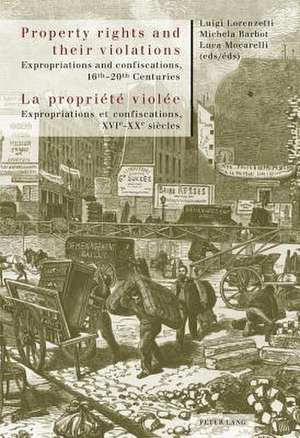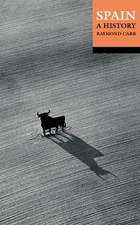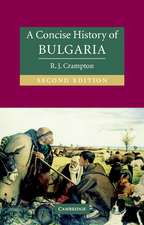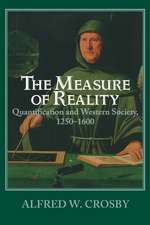Property Rights and Their Violations. La Propriete Violee: Expropriations and Confiscations, 16th-20th Centuries. Expropriations Et Confiscations, Xvi
Editat de Luigi Lorenzetti, Michela Barbot, Luca Mocarellifr Limba Franceză Paperback – 6 aug 2012
Preț: 688.77 lei
Preț vechi: 943.52 lei
-27% Nou
Puncte Express: 1033
Preț estimativ în valută:
131.80€ • 137.95$ • 109.70£
131.80€ • 137.95$ • 109.70£
Carte tipărită la comandă
Livrare economică 31 martie-14 aprilie
Preluare comenzi: 021 569.72.76
Specificații
ISBN-13: 9783034306683
ISBN-10: 3034306687
Pagini: 322
Dimensiuni: 156 x 226 x 18 mm
Greutate: 0.45 kg
Ediția:Nouă
Editura: Peter Lang Gmbh, Internationaler Verlag Der W
ISBN-10: 3034306687
Pagini: 322
Dimensiuni: 156 x 226 x 18 mm
Greutate: 0.45 kg
Ediția:Nouă
Editura: Peter Lang Gmbh, Internationaler Verlag Der W
Notă biografică
Luigi Lorenzetti is coordinator of the Laboratorio di Storia delle Alpi at the Università della Svizzera italiana (Mendrisio). His researches focus on the history of the family and the history of rural societies, as well as the property and land markets in the alpine area. He recently published Destini periferici. Modernizzazione, risorse e mercati in Ticino, Valtellina e Vallese, 1850-1930 (Udine 2010). Michela Barbot holds a «Research Based University Chair of Excellence» in Social and Economic History at the CNRS Research Unit 8533 «Institutions et Dynamiques Historiques de l'Economie» at the Ecole Normale Supérieure de Cachan (France). Member of the editorial board of «Quaderni Storici», her research focuses on social and economic history of wealth, value and property in Europe in the long run (16th-20th centuries). Luca Mocarelli is professor of economic history at the Faculty of Economics in Milano-Bicocca University. He has worked extensively on urban and regional economy, with special regard to early modern Lombardy and to manufactures, guilds and the building sector. Among his recent works: Costruire la città. Edilizia e vita economica nella Milano del secondo Settecento (Bologna, 2009). Luigi Lorenzetti est le coordinateur du Laboratorio di Storia delle Alpi de l'Università della Svizzera italiana (Mendrisio). Ses domaines de recherche portent sur l'histoire de la famille et des sociétés rurales ainsi que sur la propriété et les marchés fonciers de l'arc alpin. Il a récemment publié l'ouvrage Destini periferici. Modernizzazione, risorse e mercati in Ticino, Valtellina e Vallese, 1850-1930 (Udine 2010). Historienne de l'économie et de la société, Michela Barbot est titulaire d'une « Research Based University Chair of Excellence » auprès de l'Unité Mixte de Recherche du CNRS « Institutions et Dynamiques Historiques de l'Economie » à l'Ecole Normale Supérieure de Cachan (France). Membre du comité de rédaction de la revue « Quaderni Storici », elle travaille sur l'histoire économique et sociale de la richesse, de la valeur et de la propriété en Europe dans la longue durée (XVIe-XXe siècles). Luca Mocarelli est professeur d'histoire économique à la Faculté des sciences économiques, Université de Milano-Bicocca. Il a travaillé sur l'économie de la Lombardie durant l'époque moderne, notamment sur les activités manufacturières, les corporations et l'industrie du bâtiment. Parmi ses publications, on mentionne l'ouvrage de 2009 : Costruire la città. Edilizia e vita economica nella Milano del secondo Settecento (Bologna 2009).
Cuprins
Contents/Contenu: Michela Barbot/Luigi Lorenzetti/Luca Mocarelli: Introduction - Property and Its Antithesis: Confiscations and Expropriations at the Heart of History/Introduction - La propriété et son revers : confiscations et expropriations au coeur de l'histoire - Annamaria Monti: Illegitimate Appropriation or just Punishment ? The Confiscation of Property in ancien régime Criminal Law and Doctrine - Marica Forni: The «Negotiations for the Palazzo that Belonged to the Deceased Tomaso Marino». Palazzo Marino and its Real Estate Evaluations and Use from the Sixteenth to the Eighteenth Centuries - Fulgence Delleaux : Les confiscations militaires au sein des exploitations agricoles du Hainaut français au cours des guerres de la fin du règne de Louis XIV - Marino Viganò: Jewish Assets in Italy: Attachment, Confiscation and Restitution (1938-1945/1943-2001) - Claudia Conforti/Francesca Funis : Expropriations (et confiscations) d'immeubles pour la construction des Offices - Maria Grazia D'Amelio: Expropriation, Forced Sale, and Compensation: Legal Institutions and Professional Practice in Rome during the Pontificate of Alexander VII Chigi (1655-1667) - Daniele Andreozzi: «For Service of the Most August and of the Public». Expropriations and the Building of the Mercantile Spaces in Trieste in the XVIIIth Century - Denis Gandouet : Confiscations puis indemnisation des nobles émigrés (1792-1826) dans le district de Rochefort (Charente-Inférieure, France) - Paola Nardone: From Barons to Peasant Farmers: The Privatisation of Feudal Lands in Southern Italy in the Nineteenth Century - Nicolas Krautberger : L'expropriation d'utilité publique pour cause de risque naturel dans les départements alpins et algériens, seconde moitié du XIXe siècle - Natascia Ridolfi: Expropriation for Public Use: Construction of the Railway Line in Abruzzo - Stefano Zaggia: Expropriation as a Planning Tool. Limitations and Contradictions: The Town Plan for the Central Neighbourhoods of Padua (1921-1927) - Manuel Vaquero Piñeiro: Wheat-Storage in Fascist Italy: Evolution and Policies - Frederique Beauvois : De la liberté comme violation de la propriété privée : indemnités et abolitions de l'esclavage dans le Nouveau Monde (1777-1888) - Donatella Strangio: The Italy-Libya Agreement of 2 October 1956. The Bank of Italy's Assets in Libya after World War II - Manoela Pedroza : Expropriations qui créent des propriétaires : le cas des ventes et indemnisations de terres à Rio de Janeiro (Brésil), 1870-1910.















